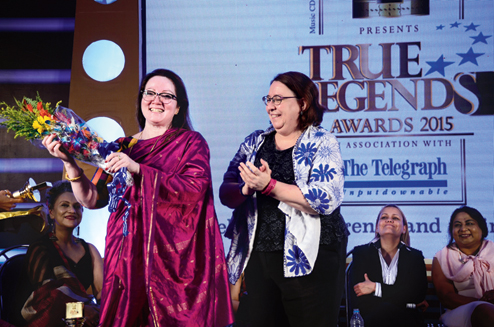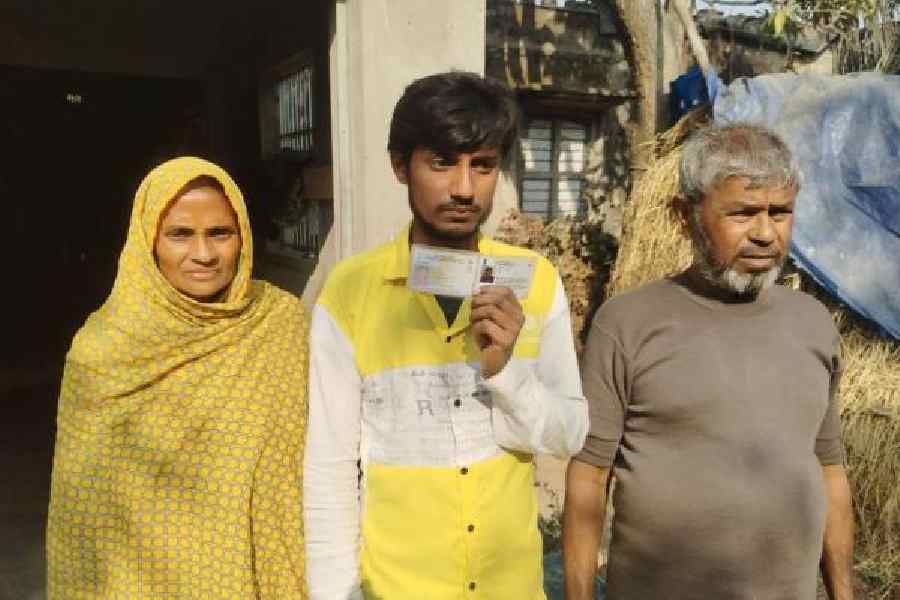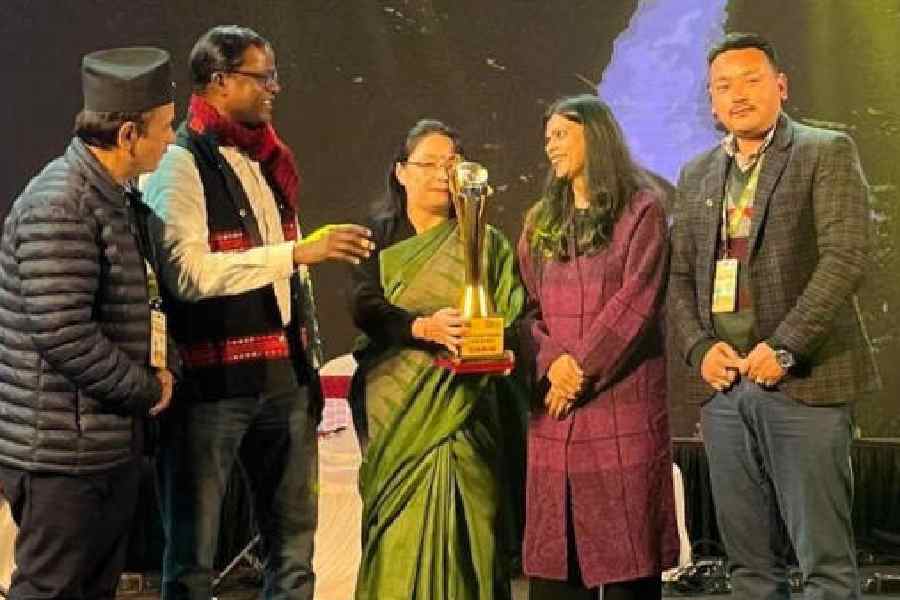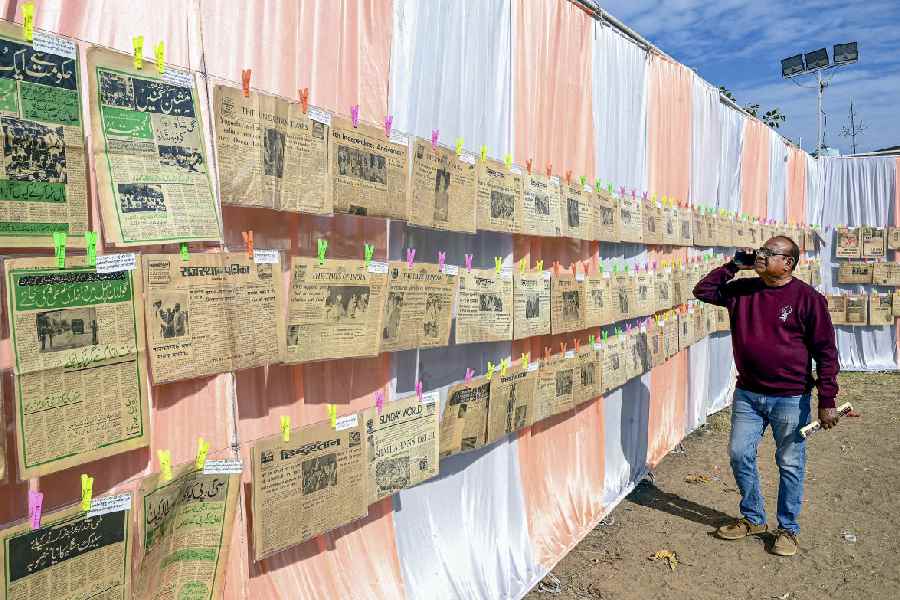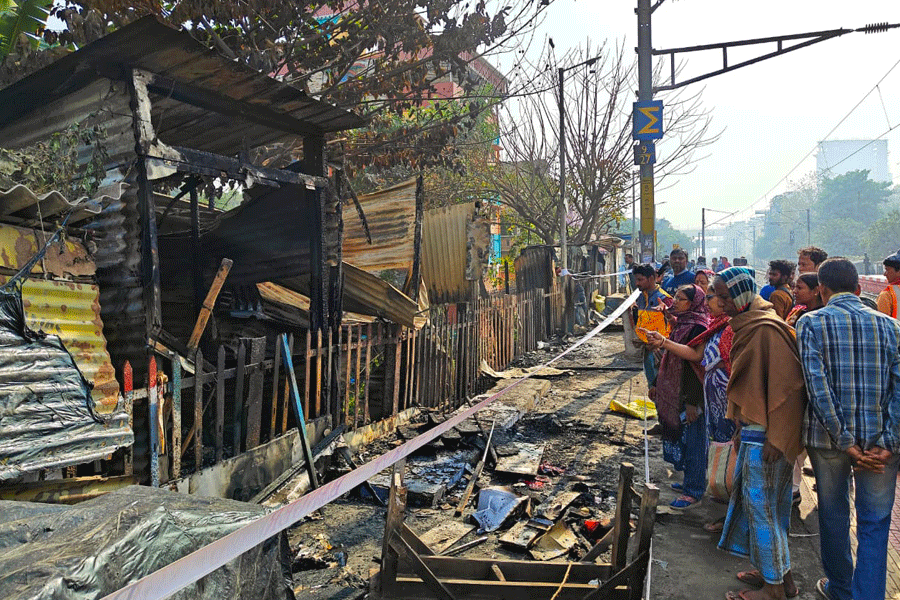SHABNAM RAMASWAMY receives her trophy from Helen LaFave

A feisty La Martiniere-bred girl who became a battered housewife and mother, grovelling for survival in shanties and on railway platforms is now the force behind Jagriti Public School, an English-medium CBSE school, and Stree Shakti in Katna, a remote village in Murshidabad where she is transforming lives of children and women.
“My story can never be old. It is a typical story like so many of us.... I chose to share it because I thought many women can think ‘If she can do it then so can I’. Even today my eyes are not dry… Today when I look at the mirror I tell myself ‘Shabnam you are the best. You are the chosen one. Out of all the people god has chosen you to do this work. Why worry if you are alone?” said Shabnam.
ACHYUTA SAMANTA receives his award from Suman Mukhopadhyay

He rose from the depths of poverty and deprivation to transform some of the Naxal-ridden tribal belts of Odisha, free them from the trap of zero opportunities and gift them a better future. He built the Kalinga Institute of Information Technology (KIIT) and the Kalinga Institute of Social Sciences, the largest free residential school for tribal children in the world.
“Art of Giving is my philosophy of life and I have been propagating it all across the world. It does not mean giving wealth or money to someone. You get immense pleasure from giving to others.We all should do something good to others.... I have implemented it and I have got a lot of pleasure from it,” said the KIIT man.
JILLIAN HASLAM receives her award from Swastika Mukherjee

The fifth of 12 siblings of British parents who did not leave India after Independence, Jillian was trundled around streets, under staircases and behind people’s houses before ending up in the slums of Kidderpore and living off charity till she left the city at 17. Today she is a motivational speaker, trainer and author who, despite memories of her morbid past and the millionaire life she now leads in London, wants to return to Calcutta and is focusing on charity work in India.
“The poorest of poor people around where we lived actually saved our lives. This is what I like to tell the whole world. The milkman gave me a bowl of milk every single day and saved my sister’s life.... The vegetable woman used to keep her bad vegetables and we used to pick it up and that’s how we cooked and that’s how we ate. The meatman and the little moodi and paanwallah were prize human beings. For me these are the true legends. They have nothing to give but they give it all,” said Jillian.
CHANDA ZAVERI receives her award from Suman Ghosh

A Calcutta girl who fled marriage at 17 is back home three decades later as a millionaire American entrepreneur with a master’s in molecular biology and a Nobel laureate as mentor. Chanda sneaked out to a life of challenges from her Kankurgachhi home in 1984. Hers was a believe-it-or-not journey from Calcutta to California, of going from penniless to founding a skincare products company. “My work in science related to diabetic surgical wounds is still going on but my heart goes out to the girls getting trafficked and we need to get involved in their lives and accept them. I was accepted when I was needy and I want to do the same,” said Chanda.
VINAYAK LOHANI receives his trophy from Piyush Srivastava, zonal head east zone, Pernod Ricard India

This 38-year-old from Uttar Pradesh showed a rare strength of mind when he chose a solo route away from home and family. The route changed his life forever. An alumnus of IIT Kharagpur and IIM Calcutta, Vinayak chose to devote his life to building in Bengal what is one of the largest free residential schools in eastern India today — Parivaar in Thakurpukur. What started “hand to mouth” and with three children, now has nearly 1,000 children on its rolls whose lives have changed with access to clean and safe living and education up to the university level. “Love and care are two sentiments that every human responds to and let me do some work that becomes a manifestation of those two values,” said Vinayak.
BRENDAN MACCARTHAIGH receives his trophy from Rupam Islam and Surojit Chatterjee

Born in Dublin in 1938, Brendan MacCarthaigh joined the Christian Brothers and taught in some Irish schools before coming to India in 1960. He has been here ever since. He has taught in the lanes and bylanes of slums and bustees around Calcutta, Asansol, Nainital, Rajasthan and Shillong and worked as an educationist with many NGOs. He is currently focused on getting SERVE (founded in 1996) to both improve the education system of the country and to save the children in the system. “It’s unique in the sense that SERVE was founded by three individuals in Calcutta — one Christian, one Muslim and one Hindu. India has the highest student suicide rate in the world. Isn’t that frightening? We’re working very hard to make it better for our children,” said Brother Brendan.
RAJAT AND GEETIKA DALMIA recieve their award from Suman Mukhopadhyay

Degenerative retinal disorders have robbed this young couple of 80 per cent of their sight but that has not held them back from pursuing their dreams. Rajat is now the proud owner of Plastechnics, the “only supplier in the country of transparent plastic covers” for Philips streetlights and tube-lights. Geetika launched Geetika Travels Pvt Ltd. They married in 2006.
“The loss of eyesight was a major setback but I didn’t let that deter me from moving ahead in life. I said ‘okay come what may I will go ahead with life’,” said Rajat.
“I lost my complete eyesight and was left with very little light perception when I was 17. But that never demotivated me about life,” said Geetika.
“A lot of people ask me how someone who can’t see can do business. My answer is to do business you don’t need just eyesight. You need management skills and more than eyesight you need vision, which we haven’t lost,” added Rajat.
PAUL WALSH receives his award from Swastika Mukherjee

This British expat came to Calcutta in 2002 to work at the British Deputy High Commission after which he stayed on and joined Future Hope. He found his heart setting up the Jungle Crows in 2004, a club of young people who play and coach rugby. He began a sports development programme called Khelo Rugby, which aims to introduce children of daily wage earners to the game of rugby and use the sport to shape and improve the lives of slum children.
“I feel very embarrassed to be standing up here.... I feel very unworthy. A little bit of an accidental legend I think.... We have tried to give the young people and children we’ve worked with something special, we worked with them to encourage them and give them a passion that will help them to improve their lives. It’s been for me an amazing journey working with children... who I’ve been lucky enough to come into contact with and share their journey. The heroes are those young people who can see something better for themselves, who have that determination and the people who support them everyday, who give them a chance,” said Paul.
SARBARI BHATTACHARYA receives her award from Helen LaFave

She was a shy political science student, on her way to becoming a professional dancer. Today, she is a key player in leading the fight against trafficking in the state that records the highest number of missing women in the country. A 1989 cadet who started off as a sub-inspector in Malda, Sarbari Bhattacharya is now officer in charge of the state CID’s Anti Human Trafficking Unit and a force to reckon with in the deep dark world of trafficking.
“Trafficking is a global threat for society. It is the second biggest threat for society after terrorism. You can’t imagine what level of torture they bear and the level of sexual exploitation they face. I was shocked to hear that every eight minutes one girl goes missing in India. I am a police officer, I have seen so many ugly faces of crime but trafficking is the worst of them. Investigation and rescue is so difficult, because in every other crime the victim is stagnant... but here the victim also changes places. In 24 hours a girl can be sent from anywhere in West Bengal to anywhere in India or abroad but by the time the case comes to me years have passed.... I am very proud that I get to do something for the victims... and that I am the person who exercises IPC and CRPC to arrest and rescue,” said Sarbari.
SOHINI CHAKRABORTY receives her award from Mainak Bhaumik

Founder-director of Kolkata Sanved, Sohini journeyed from a conventional family to independently starting Kolkata Sanved in 2004 with the vision of “saving and transforming lives through dance” and been rehabilitating survivors of violence through dance movement therapy ever since. “Yes, I’m a rebel and that’s how my journey started. And I believe that I’m a visionary leader. From a very young age, I always asked questions. And that’s when I decided to not live by traditional norms. I knew that dance had something more to give,” said Sohini, remembering a poster she had stumbled upon that narrated a first-person account of a girl trafficked that changed Sohini’s direction in life. “Those words changed my life and made me decide that I’m not going to teach dance but use its power to build a movement.”
JEEJA GHOSH receives her award from Suman Ghosh

Jeeja, 45, was born with cerebral palsy, but didn’t let her disability get in the way of her work. She is the sole breadwinner of her family, despite her defect in speech and balance. After completing her schooling from La Martiniere for Girls, Jeeja graduated from Presidency College with honours in sociology. Later, she did her master’s in social work from Delhi University and disability studies from Leeds University, UK. Having worked with the Indian Institute of Cerebral Palsy for the past 20 years, Jeeja has become the face of rights advocacy. On Wednesday evening, Jeeja chose to talk about impairment and disability. “Impairment is a functional limitation whereas disability is a result of the barriers in attitude and physical environment which stops people with impairment from participating fully in society. Our vision is to empower persons with disabilities,” she said.
ALOKANANDA ROY receives her trophy from Piyush Srivastava

What started as a dance and music workshop has evolved into a movement. Roy’s dance troupe has changed the lives of nearly 150 prisoners. Roy had been asked to try out dance therapy in Presidency jail in 2007. There was no looking back either for Roy or for the inmates who danced their way to change with her help. “No thanks to Jimmy (Tangree) for placing me next to a fiery police officer because I’m Ma to the people she punishes!” quipped Roy. “If you’ve wronged you have to be punished but everybody deserves a second chance. We shouldn’t treat them like animals. I’ve been ruled by my heart throughout and I didn’t go there to preach but for the joy of rhythm and music. They also play sports but that still has an aggression and sense of competition but when they’re dancing it’s towards a common goal to prove to the world they can,” explained the danseuse.



